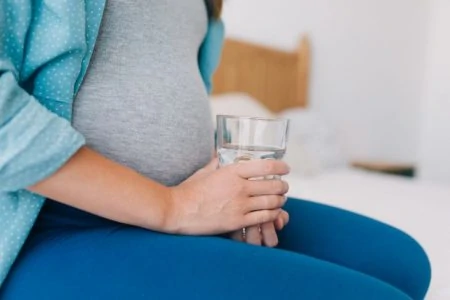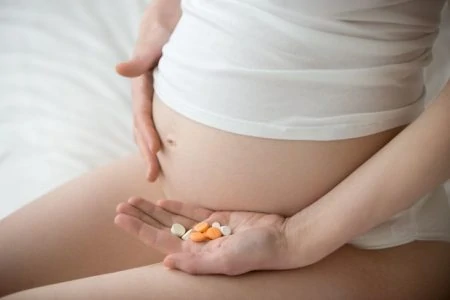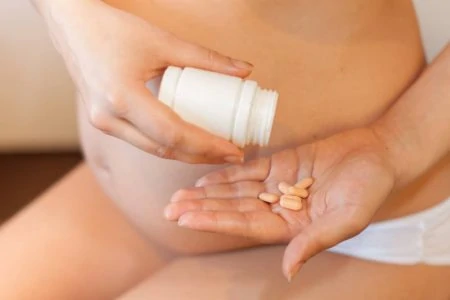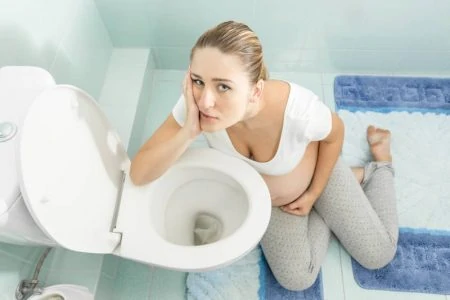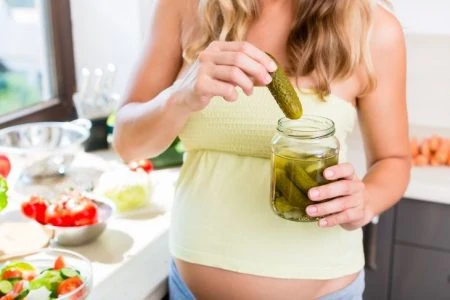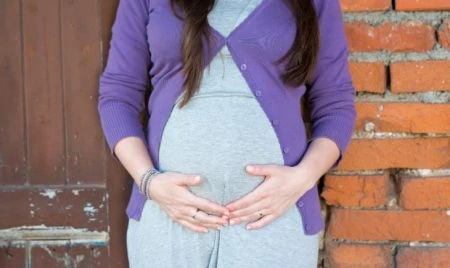Are you having a hard time staying hydrated while you’re pregnant?
Dehydration is never a good thing. But when we’re growing a tiny human inside ourselves, it becomes extra important to make sure we have enough fluids.
This guide will teach you how to spot the signs of dehydration and give you peace of mind when you already have enough to be stressed about.
- How Do I Know When I Am Dehydrated?
- The Importance of Hydration During Pregnancy
- How Much Water Should You Drink While Pregnant?
- What Causes Dehydration During Pregnancy?
- Can Pre-Existing Health Problems Make Dehydration Worse?
- The Symptoms of Dehydration During Pregnancy
- How to Prevent Dehydration During Pregnancy
- Risks of Severe Dehydration
- FAQs
- The Bottom Line
Key Takeaways
- The signs of dehydration include a dry mouth, lips and eyes, dark urine and poor focus, tiredness and dizziness.
- The recommended amount of water to drink during pregnancy is six to eight 8-ounce glasses of fluids a day on top of your foods.
- Pregnancy increases the amount of water the body uses as blood volume increases, the placenta and amniotic fluid use a lot of water, and water is needed to flush out toxins and absorb vitamins.
- Not drinking enough water may also lead to difficulty in producing breast milk.
How Do I Know When I Am Dehydrated?
Dehydration happens when your body uses more water than you drink. Many of us assume that feeling thirsty is a sign we are about to get dehydrated, but actually, thirst is a late dehydration symptom. We are already very dehydrated by the time we feel thirsty.
Here are some indications you may be fighting dehydration:
- You may suffer from a dry mouth, lips, and eyes because they lack fluid to keep them moist.
- Your urine may be dark, and you may have an increased risk of UTIs because you are not passing enough water to flush out any bacteria in the urinary tract.
- And finally, because our brains need to be hydrated to work, you might experience poor focus, tiredness, and dizziness.
If you are feeling any of these symptoms, it may be because you already lack water, and you desperately need to drink some.
Because every bodily process uses water, we usually need around two liters a day. It’s a myth that all of this needs to come from fresh drinking water. These two liters, or four pints, can come from all food and all drinks.
So if you eat a mango, you will get some water. If you drink a coffee, you will get some water.
Some people drink almost all their water as clear tap water, whereas others barely drink water at all, and almost everyone manages to stay hydrated most of the time (1).
The Importance of Hydration During Pregnancy
There are many ways in which pregnancy increases the amount of water our bodies use.
- Your blood volume increases one and a half times during pregnancy. In some women, it can even double. When not pregnant, we carry around 90 ounces of blood in our bodies. But a healthy pregnant woman can carry anywhere from 130 to 180 ounces of blood (2). If we do not drink enough water, our blood pressure may become too low.
- The placenta and amniotic fluid use a lot of water. Without enough water, the placenta and amniotic fluid may not develop properly, leading to problems later in the pregnancy.
- Too little water can cause a buildup of byproducts. When we are growing a placenta, extra skin, and, yes, a baby, we use a lot of proteins and minerals. These proteins and minerals leave little parts of themselves that need to be flushed out in our urine. Less water means less urine and fewer chances to get rid of these toxins.
- Many vitamins are known as water-soluble vitamins. B vitamins and vitamin C are only carried in water. Without enough water in your diet, you might not absorb enough of these vitamins, causing problems for your baby.
- If we do not drink enough water, we may not have enough fluid to produce breast milk. This is especially important if you have a baby or toddler you are still breastfeeding while pregnant (3).
How Much Water Should You Drink While Pregnant?
The recommended amount of water to drink during pregnancy is not an exact science. A general amount to aim for is six to eight 8-ounce glasses of fluids a day on top of your foods. That counts water, milk, juice, soup, and every other kind of liquid.
But unlike the standard recommendations, these six to eight glasses do not count the water found in solids like fruit or the water found in caffeinated drinks like tea, coffee, or soda. And if you are active or live in a warm climate, remember, the amount you need will probably increase by a cup or two.
During the second and third trimesters, you might find yourself getting thirstier again, so remember to adjust based on your needs.
Go With What Feels Good
Just remember, the more fluids you drink, the less you want to choose a drink with calories.
Try to stick with no more than two to three glasses of juice, soda, and full-fat milk every day. All the rest should be water — or sparkling water if you want some fizz (4).
What Causes Dehydration During Pregnancy?
So why do we feel so thirsty when we are pregnant? In part, it is because we are using a lot more fluids than usual.
This might not be too obvious in the first trimester because our baby is still very small, our blood volume has not changed much, and the growth of our baby and bump is still slow. But by the end of pregnancy, you will be amazed by how much extra water you are carrying and using.
There are several ways we can lose fluids during pregnancy without even noticing:
- Our dietary habits: If we feel nauseous, we might skip meals or spend a whole day eating nothing but dry crackers. If you do that too often, you will miss out on all the fluids you were previously getting from your food, and end up dehydrated.
- Being sick: Morning sickness can dehydrate us because vomiting makes our bodies lose additional fluids. The more you vomit, the more you need to drink. If you are experiencing diarrhea, you can easily become dehydrated as well.
- Water retention: Between the extra blood and feeling a bit sluggish, the later stages of pregnancy can be accompanied by a lot of swelling. Swelling in the legs especially can take a lot of water away from the rest of the body, causing dehydration. But if you exercise to get rid of the water retention, you will sweat a lot, which can also dehydrate you.
Can Pre-Existing Health Problems Make Dehydration Worse?
Dehydration can happen to anyone, but some people are at higher risk of dehydration.
Thankfully, most of these issues are things we work hard to avoid during pregnancy:
- Alcohol use.
- Heatstroke.
- High fever.
But some are things that affect pregnant women no matter how much we look after ourselves:
- Diabetes can make you more likely to get dehydrated, whether it is type 1, type 2, or gestational diabetes.
- Although we are recommended to exercise, sweat means losing up to half a cup of water per hour of activity, so we need to adjust.
- And if we are overheated because we are wrapped too warmly or spend too much time in a hot shower, we may sweat too much.
Try to avoid these situations if you can, but if you can’t, make sure to drink one or two extra glasses of water every day.
The Symptoms of Dehydration During Pregnancy
The symptoms of dehydration in pregnancy are not too different from the symptoms of dehydration at any other point in our lives. But, whereas it is not harmful to be a bit dehydrated when we are not pregnant, when we are carrying a baby, we need to be much more careful about the early warning signs of dehydration.
- Some of the earliest signs of dehydration are sleepiness, moodiness, and a headache. You might not feel dizzy, dry, or thirsty, but if your energy and mood have crashed and your head is hurting, chances are you are starting to run low on fluids.
- A sign of dehydration that is very obvious when we are pregnant is a reduced need to urinate. Because one of the first signs of pregnancy is needing to pee more, and as the baby gets bigger, the pressure on your bladder makes you go more often, less pee is never a good sign.
- Because our body temperature becomes harder to regulate during pregnancy, we might find ourselves overheating more often than usual. This is a very reliable sign we are not getting enough water. Your body uses water to cool you by sweating lightly and controlling blood flow, so being dehydrated means you may feel very hot suddenly.
- Another sign of dehydration is having contractions. If you’re having contractions, especially in hot summer months, try drinking a glass of water. If your contractions are due to dehydration, that should make them go away.
- Having a rapid heartbeat when standing up can be a sign of dehydration. Even before the blood pressure drops when standing up in dehydration, you might notice your pulse increasing upon standing, which is a sign you are probably dehydrated (source).
How to Prevent Dehydration During Pregnancy
The most important thing to do about dehydration during pregnancy is to be aware of the risks.
- Drink plenty of water.
- If you have nausea, try warm water or mild teas, which might be less of a shock to your stomach than cold water.
- Avoid eating too much protein, sugar, or salt, as this can make you urinate more. But don’t cut out all salt. You need some salt to hold on to the water you are consuming.
- If drinking is still tough, try marking a bottle of water and sipping every 15-20 minutes as if you were exercising. This can keep your fluid levels up even if you are exhausted, nauseous, and finding it very difficult to drink enough.
- Do not eat overly dry foods when you can avoid it. If your nausea calms down, make a point of having soups and fruit salads, which are rich in water and minerals that will keep you hydrated.
- If you have trouble staying hydrated, wear cool and breathable clothes, and avoid exercising so you do not lose any more water than necessary by sweating.
- It is also perfectly safe to take rehydration salts during pregnancy. The dose found in most oral rehydration salts (ORS) is not high enough to cause any problems, and if you are suffering severe vomiting or diarrhea, you may need them.
- Reduce caffeine intake. Caffeine is a mild diuretic, so if you drink a lot of caffeinated beverages, you might end up losing fluid through your kidneys.
Risks of Severe Dehydration
Even though moodiness and a low mood are normal during pregnancy, when you’re dehydrated, if you find you are irritable or angry, this might be an early sign you are headed for severe dehydration.
These are some other signs and symptoms:
- Feeling extremely thirsty.
- Dry and brittle lips.
- Being irritable and confused.
- Not urinating enough or passing dark or brown urine.
- Sunken eyes.
- Shriveled skin.
- A fast heartbeat.
- Low blood pressure.
- Contractions.
These could all be signs you are severely dehydrated. In these cases, we do not just need to drink water; we need medical help, both to re-hydrate and to find the source of the dehydration (5).
If you get severely dehydrated, you should go to the hospital, where doctors will work to re-hydrate you as quickly as possible. The best way to do this is with intravenous (IV) fluids. This is where fluids are given directly into the vein with a drip.
There are several advantages to receiving IV fluids:
- They do not rely on digestion, meaning you cannot vomit the fluids or fail to absorb them because of having too few minerals.
- It is the fastest way to get water back into your body.
- Medication and nutrients can be added to the water if they are needed.
There is a slight risk of infection and blood loss when the IV is inserted, but other than that, the use of IV fluids is much safer than any other way of handling dehydration.
FAQs
The Bottom Line
Dehydration during pregnancy is a serious issue. It is a risk to your health, your baby’s health, and both your lives.
The most important thing is to stay naturally hydrated throughout your pregnancy. If you find it hard to keep water down or see signs of dehydration, go to your doctor to see what they can do.
If you see signs of severe dehydration, go straight to the emergency room. It’s better to be overly cautious than to suffer complications.
